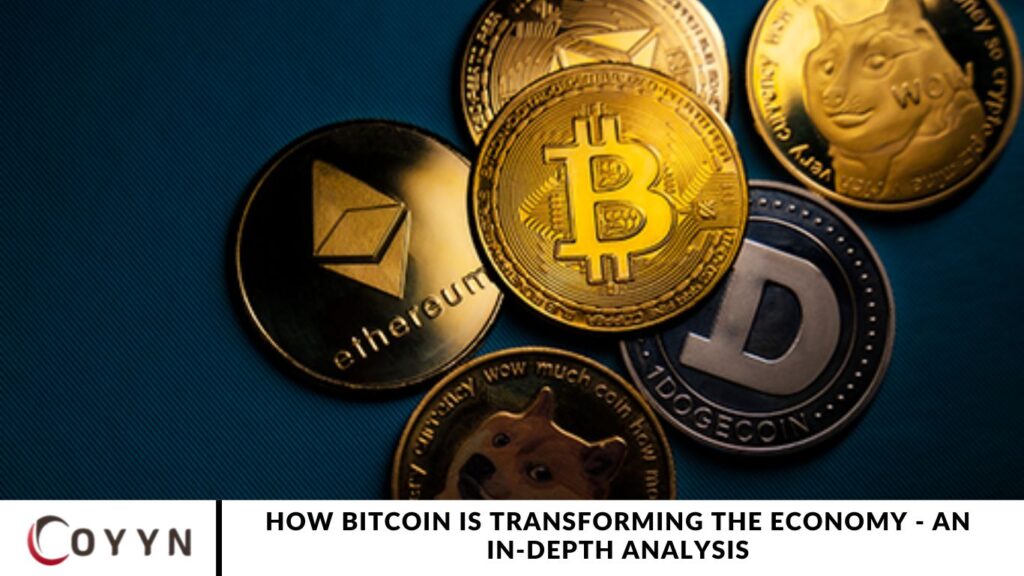Since its launch in 2009, Bitcoin has transformed the financial landscape by introducing a decentralized digital currency powered by blockchain technology. This innovation enables secure, transparent, and borderless transactions without reliance on traditional banking systems, making financial interactions more accessible and efficient.
Bitcoin’s blockchain operates on a proof-of-work (PoW) consensus mechanism, ensuring transaction immutability, security, and verifiability. As a result, it has established itself as a foundational digital asset in the modern economy, influencing sectors such as investment, cryptocurrency exchanges, and the rise of stablecoins.
Beyond its role as a medium of exchange, Bitcoin is shaping the evolution of decentralized finance (DeFi), offering an alternative to traditional financial institutions. While its price volatility remains a key consideration, its rapid adoption continues to redefine financial transactions, investment strategies, and the future of digital assets.
Bitcoin as a Catalyst for Financial Inclusion
Bitcoin is revolutionizing the financial sector by enabling direct fund transfers without the need for traditional banking intermediaries. This shift is especially significant given that, as of 2020, approximately 1.7 billion people worldwide remain unbanked—yet many have access to mobile phones. Cryptocurrency offers a viable financial solution for these individuals, bridging the gap between economic participation and digital accessibility.
How Cryptocurrency Drives Global Financial Inclusion
- Accessibility – Cryptocurrencies require only a smartphone and internet connection, making financial services more inclusive for those excluded from traditional banking.
- Decentralization – The decentralized nature of Bitcoin and other digital assets provides financial security in regions struggling with corruption, banking instability, or restrictive monetary policies.
- Lower Transaction Costs – Crypto transactions offer an affordable and fast alternative for international remittances, significantly benefiting individuals and businesses engaged in cross-border transfers.
- Innovative Financial Services – Decentralized applications (DApps) built on blockchain enable users to earn interest, secure loans, and access alternative financial tools without relying on conventional banks.
- Empowerment and Hedge Against Inflation – Digital currencies allow individuals to take complete control of their finances via secure digital wallets while also serving as a store of value in economies affected by inflation or currency devaluation.
Challenges and the Need for Responsible Crypto Adoption
While cryptocurrencies present immense opportunities, they also come with risks—particularly for vulnerable populations. Many crypto platforms still require bank accounts, limiting accessibility for the truly unbanked. Additionally, volatility and regulatory uncertainty could worsen financial disparities rather than solve them.
A balanced approach is necessary to ensure equitable access. Government policies, consumer protection measures, and an Afrofuturist perspective can help shape a financial system where digital currencies foster inclusivity while mitigating risks. By addressing these challenges, Bitcoin and blockchain technology can serve as powerful tools for economic empowerment, especially in emerging economies like Kenya.
Influence on Global Remittances and Trade
Bitcoin and other cryptocurrencies are reshaping the global financial landscape, offering a faster, more cost-effective alternative to traditional remittance and trade systems. By eliminating intermediaries, digital currencies are enhancing transaction efficiency while significantly reducing costs.
Key Benefits of Cryptocurrency in Remittances and Trade
Direct Fund Transfers
Bitcoin enables direct peer-to-peer transactions, removing the need for banks and financial intermediaries. This decentralization accelerates transfers, enhances security, and reduces processing fees.
Lower Transaction Costs and Faster Transfers
- Traditional remittance services can charge fees exceeding 8.7% for sending $200, whereas cryptocurrency transactions typically lower these costs to around 2%, saving millions annually.
- Crypto transactions settle much faster than traditional bank transfers, ensuring near-instant access to funds.
Global Adoption and Economic Impact
- Kenya – Remittances contribute significantly to the national GDP. Reducing transaction costs could save over $200 million, strengthening the economy.
- Latin America – A 40% increase in crypto-based remittances highlights growing reliance on digital currencies for cross-border payments.
- Africa – Blockchain-powered cross-border transactions now exceed $20 billion per month, demonstrating the vast economic potential.
- Asia-Pacific – Bitcoin’s Lightning Network is being integrated into local banking systems, enhancing digital fund transfers and financial accessibility.
Impact on Investment and the Financial Markets
Cryptocurrencies like Bitcoin are transforming global investment strategies, offering a compelling alternative to traditional asset classes. With its decentralized structure and fixed supply, Bitcoin is increasingly viewed as a hedge against inflation, attracting institutional and retail investors alike. The rising market capitalization of cryptocurrencies underscores their growing acceptance, while their correlation with conventional markets is reshaping financial dynamics.
Market Trends and Crypto’s Growing Influence
Surging Market Capitalization
- Between 2017 and 2021, the market value of crypto assets skyrocketed from $620 billion to nearly $3 trillion, reflecting expanding investor interest and adoption.
Correlation with Traditional Assets
- Cryptocurrencies, once seen as independent from traditional markets, are now increasingly correlated with stocks and commodities.
- This trend intensified during the pandemic, suggesting that digital assets are no longer purely speculative but integral to broader investment portfolios.
Impact on Real Estate and Consumer Behavior
Real Estate Market Growth
- Areas with high cryptocurrency wealth have experienced notable increases in home values, linking crypto-driven gains directly to real estate appreciation.
Shifts in Consumer Spending
- Investors with unrealized crypto profits display a higher marginal propensity to consume (MPC) than those with traditional equity gains, influencing spending trends and economic cycles.
Challenges and Regulatory Considerations
Financial Stability Risks
- The increased adoption of digital assets introduces potential risks, including market volatility, liquidity concerns, and systemic financial instability.
Regulatory and Monetary Policy Shifts
- The rise of Central Bank Digital Currencies (CBDCs) signals a shift in monetary policy, emphasizing the need for clear regulatory frameworks to manage crypto’s growing economic influence.
Challenges and Regulatory Landscape
The evolving regulatory landscape surrounding Bitcoin and other cryptocurrencies demands a multifaceted approach to address financial, environmental, and consumer protection concerns. As digital assets gain mainstream adoption, governments and regulatory bodies are working to establish comprehensive frameworks that balance innovation with risk mitigation.
Key Regulatory Challenges and Considerations
Environmental Impact of Bitcoin Mining
- Bitcoin mining consumes vast amounts of energy, with a single transaction using as much electricity as 10 households in a day.
- Despite concerns over its carbon footprint, Bitcoin accounts for just 0.08% of global CO2 emissions, leading to debates on sustainable mining solutions.
Regulatory Gaps and Consumer Protection
- Operating on decentralized networks, cryptocurrencies bypass traditional financial oversight, making them vulnerable to fraud, volatility, and deceptive practices.
- Currently, only one-third of countries have implemented consumer protection laws for cryptocurrency users.
- Nations like India and Japan are spearheading efforts to enhance crypto security measures, focusing on transparency and fraud prevention.
Legal and Compliance Frameworks
- The absence of a centralized authority complicates legal recourse in cases of hacking, financial fraud, or dispute resolution.
- Regulatory classifications vary widely: in the U.S., cryptocurrencies are treated as both property and commodities, leading to fragmented state and federal oversight.
- Global initiatives are pushing for standardized regulations to combat money laundering, tax evasion, and financial fraud, ensuring the stability and legitimacy of digital asset markets.
The Volatility of Cryptocurrencies and Its Economic Consequences

Despite their increasing adoption, cryptocurrencies remain highly volatile. The value of Bitcoin, for instance, can fluctuate by thousands of dollars within hours, making it an unpredictable investment. This volatility presents both opportunities and risks for investors, businesses, and governments as they navigate the evolving digital asset landscape.
Price fluctuations can be both beneficial and challenging for businesses that accept cryptocurrencies as payment. Sudden price surges can lead to unexpected profits, enhancing revenue potential. Rapid declines can result in significant losses, posing financial risks that businesses must carefully manage.
The Environmental Impact of Cryptocurrencies
As cryptocurrencies continue to gain mainstream adoption, their environmental impact has become a significant point of concern. Bitcoin and other proof-of-work (PoW) cryptocurrencies rely on energy-intensive mining processes to validate transactions, raising questions about their carbon footprint and long-term sustainability. This has sparked global discussions on the need for greener alternatives.
Many cryptocurrencies are transitioning to more energy-efficient consensus mechanisms, such as proof-of-stake (PoS), which significantly reduce energy consumption. This shift reflects a broader industry trend toward sustainability, as stakeholders recognize the importance of balancing innovation with environmental responsibility.
By 2024, the focus on eco-friendly cryptocurrency solutions is expected to intensify. Governments, corporations, and consumers are increasingly prioritizing sustainability, driving the development of greener blockchain technologies. As a result, the industry is likely to see a surge in environmentally conscious digital currencies, helping to bridge the gap between financial innovation and ecological responsibility.
Frequently Asked Question
How is Bitcoin influencing the global economy?
Bitcoin is reshaping the global economy by providing a decentralized, borderless financial system that reduces reliance on traditional banking. It facilitates faster, low-cost international transactions, promotes financial inclusion, and serves as a hedge against inflation in economies with unstable fiat currencies.
Why is Bitcoin considered a hedge against inflation?
Unlike traditional fiat currencies, Bitcoin has a fixed supply of 21 million coins, preventing excessive inflation caused by money printing. This scarcity, combined with its decentralized nature, makes Bitcoin an attractive store of value in countries facing economic instability.
How is Bitcoin impacting traditional banking and financial institutions?
Bitcoin challenges traditional banks by offering peer-to-peer transactions that eliminate intermediaries, reducing fees and transaction times. Some banks are adapting by integrating Bitcoin services, while others are exploring Central Bank Digital Currencies (CBDCs) as a response.
How does Bitcoin affect international remittances?
Bitcoin is revolutionizing remittances by enabling fast and low-cost cross-border payments. Unlike traditional remittance services that charge high fees and take days to process, Bitcoin transactions settle within minutes and cost significantly less, benefiting millions of unbanked individuals.
What role does Bitcoin play in financial inclusion?
Bitcoin provides access to financial services for unbanked and underbanked populations, particularly in developing regions. With just a smartphone and internet access, individuals can send, receive, and store Bitcoin without needing a traditional bank account.
Conclusion
Bitcoin has emerged as a disruptive force in the global economy, reshaping financial systems, investment strategies, and international trade. By offering a decentralized, secure, and efficient alternative to traditional banking, Bitcoin has empowered individuals and businesses worldwide, fostering financial inclusion and reducing reliance on intermediaries. Its role in hedging against inflation, streamlining remittances, and challenging traditional financial institutions highlights its growing significance in modern economies.
Despite its numerous advantages, Bitcoin faces regulatory, environmental, and volatility challenges that must be addressed for widespread adoption. Governments and financial regulators continue to develop frameworks to integrate Bitcoin into existing financial systems while ensuring stability and consumer protection. Meanwhile, innovations in blockchain technology and sustainable mining practices are helping to mitigate environmental concerns and enhance scalability.


